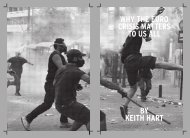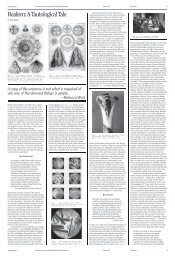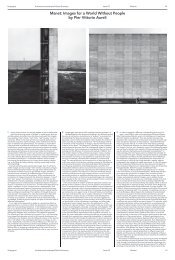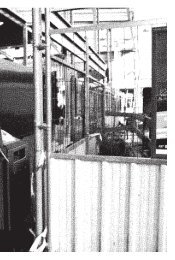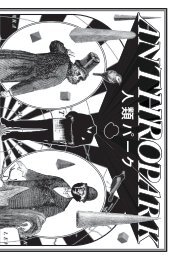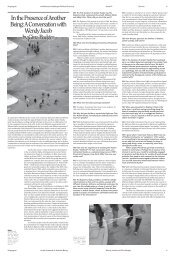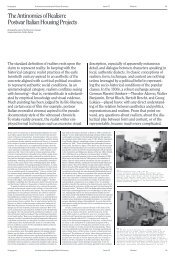Full Issue - Scapegoat
Full Issue - Scapegoat
Full Issue - Scapegoat
Create successful ePaper yourself
Turn your PDF publications into a flip-book with our unique Google optimized e-Paper software.
<strong>Scapegoat</strong> Architecture/Landscape/Political Economy<br />
<strong>Issue</strong> 01 Service<br />
19<br />
that are attempting to create a precedent for<br />
public involvement in territorial planning and<br />
to challenge the very laws that define territorial<br />
planning. 3<br />
Our project was understood as threatening<br />
private property. Early on we declared that<br />
we wanted to question the privatization of the<br />
cinema—we made this very clear. The theatre is<br />
the biggest in Vilnius, it’s in the centre of the<br />
city, it has a diverse audience, and it is known<br />
throughout the country. The questioning of the<br />
privatization of that particular site, because it is<br />
so charged, is seen as a threat to the very idea<br />
of privatization. Therefore we were accused of<br />
being nostalgic, Bolsheviks wanting to appropriate<br />
land.<br />
SS: Is that what you want to do?<br />
GU: That’s a good question. First of all, ‘we’<br />
is a multitude. Who is the ‘we’ in this project?<br />
There is a multiplicity of perspectives about the<br />
theatre and different desires for its future. For<br />
instance, there are architects who try to workshop<br />
new visions for the site. (fig. 13) And then<br />
there is a very strong group of preservationists<br />
and heritage enthusiasts, and they are entirely<br />
against the architects because they think the site<br />
should not be touched. They say it is important<br />
because it is in front of the medieval defense wall,<br />
a site which was left unbuilt for centuries so the<br />
guards could maintain sight lines from the castle.<br />
So, the only other buildings around were valueless,<br />
small wooden buildings set up for trade.<br />
The Soviet cinema was the first prominent<br />
building to inhabit the space. Moreover, the Soviets<br />
built the cinema atop the medieval water<br />
infrastructure. So, strangely, if they excavated it,<br />
either underneath, around or through the cinema,<br />
the city could have a fantastic water supply again.<br />
We were fantasizing about producing mineral<br />
water to subsidize our lawsuits! The project proposed<br />
by the private developers was planning<br />
to destroy the medieval infrastructure and build<br />
massive underground parking garages. There are<br />
a lot of contradictions between those who want<br />
to build and those who want to preserve.<br />
fig. 13<br />
SS: Are you more interested in bringing together<br />
as many of these contradictory perspectives<br />
as possible rather than resolving<br />
them or taking a position in relation to them?<br />
GU: I think the former is right. If you look at our<br />
first calls and meetings we would say, “Lietuva is<br />
for all.” It’s not just for one group or one private<br />
interest. And we need to understand, or define,<br />
what a public interest is, though we do recognize<br />
that the public is agonistic—structurally so.<br />
The cinema can become this monument through<br />
which we re-negotiate these agonistic perspectives.<br />
We need to slow down the process of<br />
15. America<br />
Will Help<br />
Us, action<br />
at Cinema<br />
Lietuva,<br />
Vilnius,<br />
June 2005.<br />
Nomeda<br />
Urbonas<br />
12. Inside<br />
the lobby<br />
of For<br />
Lithuania,<br />
Pro-Test<br />
Lab, Vilnius,<br />
April<br />
10, 2005.<br />
Nomeda<br />
Urbonas<br />
fig. 12<br />
development to accomplish this. We turned the<br />
site into a space of constant workshopping and<br />
constant negotiation of bodies. We have also introduced<br />
different vocabularies of public space<br />
into the legal framework, popular consciousness,<br />
and specialist jargons.<br />
SS: You are trying to return the theatre to what<br />
it was in Soviet times, a space of agonism and<br />
a space of freedom?<br />
GU: Yes. And what’s uncanny is that the nationalists<br />
today consider the former cinemas and<br />
housing as propaganda machines. But there<br />
were always unanticipated or double functions.<br />
When intellectuals were sitting around the table<br />
13. VIP<br />
Market,<br />
by ASK,<br />
Vilnius,<br />
April 2005.<br />
Nomeda<br />
Urbonas<br />
14. Sold<br />
Out, banner<br />
action by<br />
Vilnius<br />
residents,<br />
April 2005.<br />
Nomeda<br />
Urbonas<br />
fig. 14<br />
fig. 15<br />
in a restaurant, bar or cultural centre and having<br />
a discussion, they knew that the KGB was recording<br />
them, but they developed a subversive<br />
language that allowed them to discuss things<br />
and attempt to change the system. At the same<br />
time, both the KGB and the intellectuals knew<br />
very well that they were each listening to each<br />
other. In a sense, they were communicating<br />
with each other while avoiding each other. The<br />
fig. 16<br />
who was a musicologist, decided to go to law You see, it’s a war with many fronts. 5<br />
16. Talk show as school. The court processes are<br />
so laborious and take so much<br />
part of bus<br />
time in Lithuania (we’ve been in<br />
tour of<br />
vanished the courts for almost five years<br />
cinemas in now), you would not believe it.<br />
fig. 17<br />
Vilnius,<br />
For example, they appointed<br />
Lietuva TV,<br />
Vilnius, a judge in October, and then in<br />
May 2005. Nomeda<br />
Urbonas December they cancelled the<br />
hearing because the judge said<br />
that he is not objective because<br />
17.<br />
Devel opers’<br />
vision for the site. Date and<br />
author<br />
unknown. our lawyer was his student. Then<br />
they appointed another judge in<br />
January and announced the hearing<br />
would take place in March.<br />
Then it came out that this very<br />
judge announced a positive decision<br />
fig. 18 18.<br />
Pro-Test<br />
Scarf, based on regional soccer<br />
scarfs,<br />
August 2006. Nomeda Urbonas 19. Case files in Administrative<br />
Court,<br />
Vilnius, May 2007.<br />
Nomeda<br />
Urbonas<br />
about our case in the lower<br />
courts a few years ago, so again<br />
they dismantled the court to announce<br />
another judge. Now we<br />
are waiting for the new judge to<br />
be announced, but it is summer<br />
and they won’t do it during the<br />
summer because everyone is on<br />
vacation, so it won’t be until the<br />
fall. This pace is in our favour because<br />
the musicologist has time<br />
to finish his law degree.<br />
But to get back to the intellectuals<br />
and subversive language,<br />
one of the preservationists was<br />
sued by the developers for defamation<br />
of character. They had hired a media<br />
monitoring company to make records of all of<br />
our public speeches and gather all of our written<br />
statements. So we have to be very careful of<br />
how we speak. In one of the recordings the preservationist<br />
said, roughly, “companies like these<br />
are destroying places for kids to play, public<br />
parks, and cultural spaces, etc. The developers<br />
are taking over lots that used to be in the public<br />
good.” So the developers brought her to court<br />
fig. 19<br />
Lietuva case is an example of this very specific and uncanny communication that demands this<br />
subversive language.<br />
I’ll give you another example. Once we were understood as dismantling or even just questioning<br />
processes of privatization, there were no lawyers who would dare to join us. So as a consequence,<br />
one of the members of the movement, for defamation and provided these recordings<br />
as proof. In return, we commissioned the Lithuanian<br />
Institute of Semiotics to provide a counter<br />
analysis of the recordings. The president of the<br />
institute—who by the way is a good friend of<br />
vationist’s comments were not defamatory by<br />
Greimas 4 —successfully argued that the preser-<br />
her speech. That’s how we won the case!<br />
analyzing all of the pauses and the intonation of<br />
fig. 20<br />
20.<br />
Current<br />
state of<br />
Cinema<br />
Lietuva,<br />
Vilnius,<br />
August<br />
2009.<br />
Nomeda<br />
Urbonas<br />
Gediminas Urbonas is an associate<br />
professor in the Art, Culture and<br />
Technology program at MIT. Nomeda<br />
Urbonas is PhD researcher at Norwegian<br />
University for Science and<br />
Technology. Gediminas and Nomeda<br />
represented Lithuania at the Biennale<br />
di Venezia, Italy, in 2007.<br />
Notes<br />
1. LIDL’s full company name is Lidl Stiftung &<br />
Co. KG, a German supermarket chain with stores<br />
all over Eastern and Western Europe. The same<br />
is true of ALDI, whose full company name is<br />
ALDI Einkauf GmbH & Co. oHG.<br />
2. Lithuanian nationalism has historical roots<br />
in the mid-19th century colonial Tzarist Russian<br />
project of russification, as a reaction to<br />
this threat of assimilation to the Russians or<br />
Poles. During the Stalinist era, nationalism<br />
was strengthened as a technique of separation<br />
and antagonism between the smaller “brother”<br />
and “sister” nations, and the “father of all<br />
nations” in the Soviet family.<br />
3. During the summer of 2008, Citizens Group<br />
found that the Lithuanian translation of the<br />
Aarhus Convention (which guarantees public<br />
participation in spatial planning) was mistranslated<br />
in such a way that public participation<br />
was compromised. An appeal was made to the<br />
Aarhus Convention Compliance Committee, and the<br />
Lithuanian government reacted. In the next few<br />
months, a new translation was produced by the<br />
Lithuanian government and officially published.<br />
The incorrect translation, in effect for almost<br />
10 years, had violated public rights and<br />
enabled the establishment of legal precedents<br />
that contradict the principles of the Convention.<br />
Such court practice is convenient for the<br />
developers and corrupt public administrators<br />
alike, causing major issues for the arguments<br />
of the Citizens Group.<br />
4. Lithuanian Algirdas Julien Greimas is one of<br />
the most influential semioticians of the 20th<br />
century.<br />
5. Eds. note: As of 6 June, 2011, the Cinema<br />
Lietuva court case has been once again delayed<br />
due to the resignation of the judge.<br />
Project<br />
Pro-Testo Laboratorija, Lietuva<br />
19



